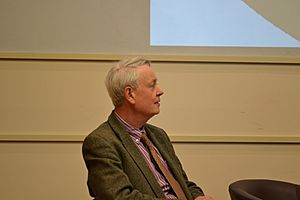James Binney facts for kids
Quick facts for kids
James J. Binney
|
|
|---|---|

Binney in 2013
|
|
| Born | 12 April 1950 Surrey, UK
|
| Alma mater | University of Cambridge (BA) Christ Church, Oxford (DPhil) |
| Known for | Theoretical galactic and extragalactic astrophysics |
| Awards |
|
| Scientific career | |
| Fields | Astrophysics |
| Institutions | Institute for Advanced Study, Princeton University of Oxford Princeton University |
| Thesis | On the Formation of Galaxies (1975) |
| Doctoral advisor | Dennis Sciama |
| Doctoral students | Brian Greene |
James Jeffrey Binney is a famous British astrophysicist. He was born on April 12, 1950. He is a professor of physics at the University of Oxford. He used to lead the Theoretical Physics department there. Professor Binney is best known for his work on how galaxies form and move. He studies both our own galaxy, the Milky Way, and other galaxies far away.
His Journey in Science
James Binney started his studies at the University of Cambridge. He earned a top degree in mathematics in 1971. After that, he went to the University of Oxford. There, he earned his D.Phil. degree in 1975. This is a very high-level science degree.
After finishing his studies, Professor Binney worked at different places. He spent some time at Princeton University in the United States. In 1981, he returned to Oxford. He became a university lecturer and a fellow at Merton College. He also visited the Institute for Advanced Study in Princeton, New Jersey several times. He became a full professor of physics in 1996.
Amazing Discoveries and Awards
Professor Binney has received many important awards for his work. These awards show how much he has helped us understand the universe.
Some of his awards include:
- The Maxwell Prize in 1986.
- The Brouwer Award in 2003.
- The Dirac Medal in 2010.
- The Eddington Medal in 2013.
- The Isaac Newton Medal in 2023.
He has been a member of the Royal Astronomical Society since 1973. In 2000, he became a Fellow of the Royal Society. This is a very high honor for scientists in the UK. In 2025, he received the Royal Astronomical Society Gold Medal for Astronomy. This award was for all his amazing work on galaxies.
What He Studies
Professor Binney's research helps us understand the universe better. He studies many interesting things about galaxies, such as:
- How hot gas in space cools down and affects galaxies.
- How huge explosions from supernovas change the gas in galaxies.
- How galaxies move and interact with each other. This includes our own Milky Way galaxy.
- He also creates special computer models to understand how galaxies and their orbits work.
 | John T. Biggers |
 | Thomas Blackshear |
 | Mark Bradford |
 | Beverly Buchanan |

